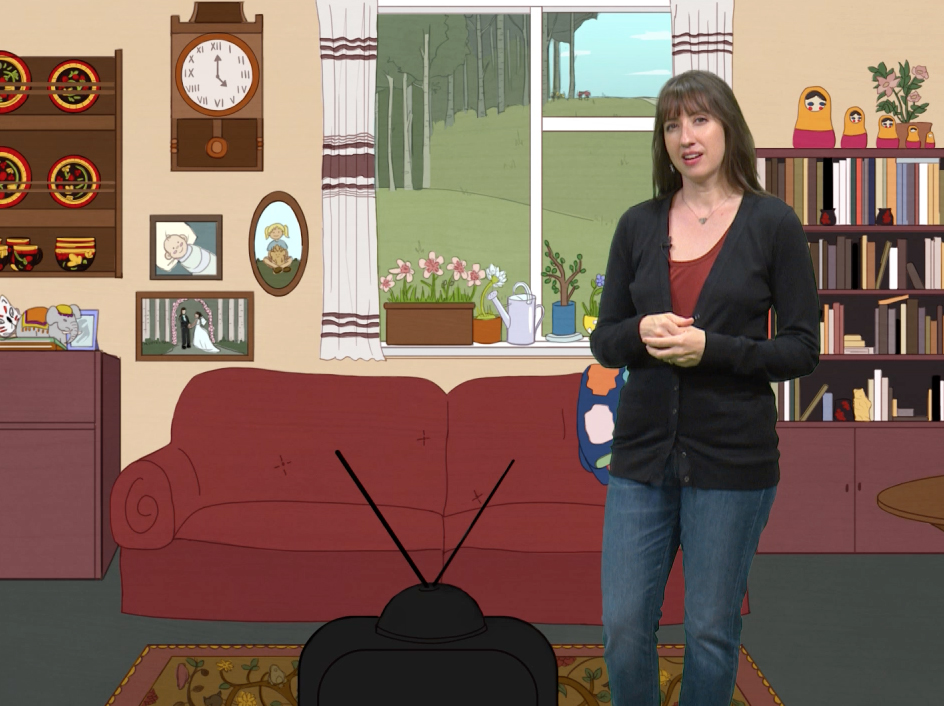Sometimes we fall in love when we least expect it. Arriving at The University of Texas at Austin as a mathematically inclined freshman, Heather Rice had no intention of learning Russian. Now a lecturer in Slavic and Eurasian Studies at UT Austin, she’s spent the past two decades studying and teaching the language and culture and recently helped create the university’s first online Russian sequence.
Rice discovered her fascination with Russian entirely by accident. Language study was a secondary consideration when she started college and she figured she would continue with Spanish, having taken it in high school. However, the mathematics program she was pursuing required students to learn one of three languages considered useful for graduate research —French, German or Russian. Rice chose German but the intro classes were full so, on the advice of her advisor, she got on a waitlist and enrolled in Russian. Finding herself in a small class populated mostly by graduate students, she was simultaneously daunted and intrigued.
“I felt overwhelmed at first and was so intimidated,” recalls Rice. “But I wanted to catch up and it felt like this safe space because it was a small group of people, and I just thought it was so interesting.”
This early experience was pivotal for Rice. Within months she’d changed her major to Russian and has never looked back.
Speaking of benefits
While Rice opted to pursue Russian purely out of excitement for the subject matter, she is also well aware of the benefits of foreign language study.
Knowing a second language creates greater opportunities for travel and employment. It allows you to read literature in its original language and gives you access to journalism not available in English. Imagine being able to compare U.S. reporting on COVID-19 in China or political conflicts in Ukraine with news sources directly from those countries.
And studies have shown that learning a second language can improve brain function and even prevent cognitive decline in old age.
But perhaps the most immediate benefit is the chance to interact with people from cultures other than our own.
“The more we can open ourselves to experiences afforded through language exchange and immersion into a culture outside of our own and the more we can go beyond travel as just a tourist, the more we can connect with others and better understand ourselves and why it is we are different,” says Rice. “We learn to see our own culture more clearly the more we get to know another one.”
Start early and you can go far
With new travel bans cropping up every day, it may seem like going abroad is a thing of the past, but it may also be part of the future. Rather than lamenting your canceled vacation plans, you can use this time to prepare for travel by learning a language.
While she strongly supports students at any level doing a study abroad program, Rice explains that having more semesters of practice before you arrive will vastly improve your experience. This is because novice speakers more often find themselves talking with locals in English (who are also eager to practice their language skills). Having a solid base allows students to effectively communicate sooner in their travels, which can help them gain greater mastery of a language. It’s the difference between just being able to order at a restaurant and being able to carry on a conversation with your dining companions in their native language.
Starting a language sooner also means more time to build community with your fellow students. In her years of teaching, Rice has observed that the shared experience of learning the language alongside one’s peers makes it easier for students to persist when they encounter difficulties.
Rice also reminds students to think beyond the obvious options when choosing a language to study. UT offers more than 30 languages and the less commonly taught ones often have smaller class sizes, which means more time to speak with instructors and more opportunities to connect with a community of learners.
“I would encourage students to take a language that interests them,” says Rice. “It’s such a unique opportunity here at UT with all of the instructors and all of the languages offered.”
Yes, you can learn a language online
Rice was hired to develop content for UT’s online Russian sequence well before COVID-19 forced everyone to embrace remote learning. Initially she was skeptical of whether the online format would work for languages, which require so much communication among students and their instructors.
“All the research that I’ve seen says that students are more likely to buy into anything, whether it be language or any other class, if they feel connected to their instructor and to their peers,” Rice explains. “So, how do we accomplish that online?”

Rather than trying to replicate the in-person learning experience, she focused on finding ways to create a sense of community using resources specific to the online format. One example is having students upload videos of themselves responding to an assigned prompt on the class discussion board and then viewing and commenting on each other’s videos. Student also pair up to work on assignments via Zoom, which can be recorded for the instructor to review. Such exercises encourage comradery and competition, says Rice, and remind students that they’re not learning alone.
Rice is also working to incorporate language exchanges with native speakers into her classes. In the pilot program, her class conversed online with a student teacher in Moscow who sometimes took them on virtual excursions to see the city.
Put yourself in a different place
One of the many things Rice loves about Russian is the chance to explore a world so different from her Houston roots. She recalls her first trip to St. Petersburg during her senior year of college as both wonderful and frightening. Seeing the culture that she had been studying at a distance suddenly spring into reality amazed her, while the sheer foreignness of it all was unexpected and a bit overwhelming. Everything was different; the cars, the smells, the daily patterns of sunrise and sunset.
“It’s things like that that you don’t see coming. It’s not just the language, it’s not just customs, it’s not just food,” she says. “Everyone, for a week, for a semester, for however long, should experience that. Just putting your physical self in a different place.”
But Rice has also seen the value of learning about other cultures via communities within one’s home country.
Years ago, she was tasked with teaching Russian to an unenthusiastic audience of students at a Chicago charter school. The school’s population was majority Hispanic but its superintendent had chosen to offer Russian out of a personal fondness for the language. Students and parents alike expressed frustration over being saddled with a subject to which they felt no connection and Rice, for the first time in her career, had to persuade her class of Russian’s merits.
“I had to ask myself this question, ‘why should you want to learn Russian?’” she says.
So, Rice searched for creative ways to help her students connect with Russian and to find commonalities between their respective cultures within the U.S.
“Sometimes, it was as easy as convincing them the Cyrillic alphabet would give them a secret way to communicate with their classmates,” she says. “Other times, I had to tap into their interests.”
One of her proudest moments was a project in which the class created a reenactment of Gogol’s “The Overcoat.” Students listened to the story and took notes, and Rice encouraged those with artistic inclinations to also draw what they heard. This evolved into a series of videos reimaging the tale in present day Chicago. One of the students was so inspired by the experience that he went on to study filmmaking and now directs music videos.
In so many ways, Rice explains, language study allows us to experience a world beyond what we imagined.
“Studying Russian opened doors for me I didn’t know existed and it is exactly this that I try to keep in mind with every new group of students I encounter,” she says. “Learning another language leads us to experiences that often change our lives for the better.”
